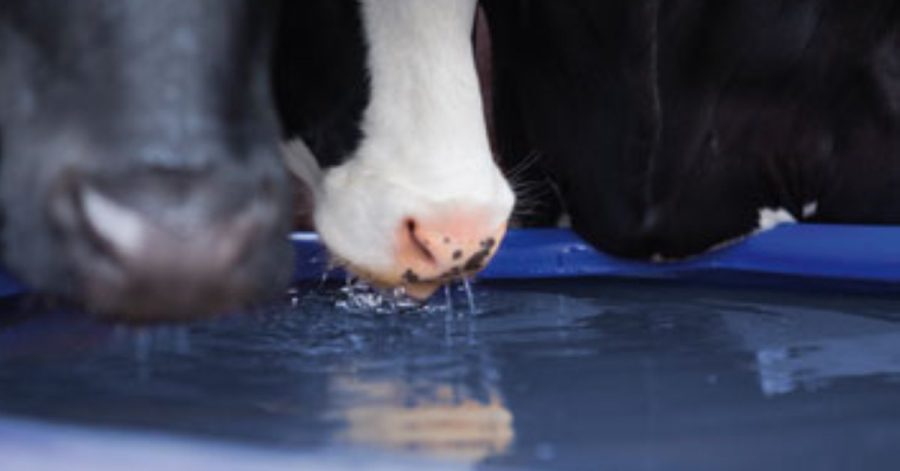Unlock the key to enhanced milk yield: pristine, fresh water. Seeking healthier herds and increased dairy output? Delve into how water cleanliness drives dairy excellence.

Ensuring cows have access to clean, fresh water is paramount for their health and milk production. This principle, underscored by the expertise and observations of veterinarian David Reid, serves as a cornerstone in the quest for optimal dairy herd performance. Throughout his distinguished career as a dairy consultant, Reid has consistently emphasized the critical role of water quality in sustaining and enhancing dairy operations. Drawing from years of hands-on experience and consulting on dairies worldwide, his insights reveal that even simple improvements in water management can yield significant increases in milk yield and bolster overall herd health.
Reid’s guidance is a pivotal resource for dairy producers striving to optimize animal welfare and production metrics by advocating for routine cleaning and proper water system setups. This article will explore the essential strategies for improving water quality and management in dairy operations, as championed by industry expert David Reid.
Real-Life Success Stories: The Impact of Pristine Water Bowls
One compelling case study from Reid’s extensive experience reveals the transformative impact of clean water on dairy cows. In several tie-stall barns in southwest Wisconsin, Reid encountered numerous issues stemming from small-diameter hoses and rusty pipes, which severely compromised water quality and ultimately affected the cows’ health and milk production.
To address these challenges, Reid upgraded the old water lines to more robust 2-inch lines coupled with ¾-inch hoses while also instituting daily cleaning protocols for the water bowls. This intervention significantly increased milk yield by 2-3 pounds per cow per day. Enhanced water quality not only fostered healthier rumens but also bolstered the cows’ immune systems.
This significant rise in milk output underscores the importance of water cleanliness in dairy operations, illustrating that the adage “you are what you drink” is also profoundly applicable to dairy farming.
Emphasizing Water Cleanliness: A Critical Component in Dairy Production Success
The significance of water in dairy farming is universal. Clean and accessible water is vital for optimal cow health, whether managing a herd of 100 or 10,000 cows. Veterinarian David Reid highlights the strong link between water quality and cow productivity. Healthy rumens, crucial for digestive efficiency, depend on adequate and clean water intake. This boosts the immune system and improves milk quality and mastitis control.
“It’s an important part of creating a healthy rumen, which means you have a healthier immune system, which will help with milk quality, mastitis control, and all the other things we see in dairy production medicine.”
Reid’s experiences show the transformative power of water management in dairy farming. Effective water systems with adequate flow rates, frequent cleanings, and proper sanitization keep cows hydrated and their digestive systems efficient. This underscores a fundamental truth: the key to healthier, more productive cows, and successful dairy operations, starts with water.
Crucial Insights from Practical Experience
When reevaluating the essentials for optimal dairy production, there is a clear correlation between water quality and overall cow health. Below are key lessons from expert David Reid:
- Stay keen on clean: Merely making water accessible is insufficient. Regularly clean and sanitize water sources using chlorine dioxide or peroxide.
- A lactating cow is thirsty: Prolactin, released during milking, triggers thirst. Fresh water in the return alley boosts hydration.
- Cows prefer warm water. They drink more when the water is warmer. For optimal temperature, use discharge water from milk cooling systems.
- Transition-period cleanliness: Immaculate waterers in pre- and post-fresh pens improve appetite and health during calving.
- Construct with water in mind: Design facilities with 4-5 linear inches of drinking space per cow and at least two water sources per pen.
Pro Tips for Maintaining High-Quality Water for Dairy Cows
The critical importance of precise monitoring in optimizing dairy herd performance is often understated, particularly in the context of water meter utilization. Integrating water meters into dairy management frameworks allows for substantial correlations between water intake and herd efficiency to be established. Reid champions an innovative strategy of installing water meters in every pen, facilitating comprehensive real-time data collection and subsequent analytical assessment.
“By scrupulously monitoring water intake, we can establish direct links between cleaning schedules and enhanced dry-matter intake, culminating in increased milk yield,” Reid asserted.
Actionable Steps for Implementing Water Meters:
- Install water meters: Ensure all pens monitor water consumption accurately.
- Analyze data: Leverage this data to pinpoint water-related issues or areas of improvement.
- Adjust cleaning schedules: Synchronize water intake and cleaning routines for optimal efficiency.
This forward-thinking approach bolsters health and productivity and exemplifies the seamless integration of cutting-edge technology with conventional dairy farming practices.
Firsthand Accounts
Client testimonials provide compelling real-world examples that underscore the profound impact of meticulous water quality management on milk yield. For instance, John Smith, a dairy farmer from Michigan, shared, “After revamping our water systems with clean and well-maintained waterers, we’ve observed a consistent increase in milk production – about 3 pounds more per cow per day.” Such firsthand accounts are invaluable as they depict the tangible benefits of prioritizing high-quality water in dairy operations.
“Our transition to larger diameter water lines and daily cleaning routines translated directly to higher milk yields and healthier cows. It’s an investment paid off manifold.” – Sarah Thompson, Dairy Consultant, Wisconsin.
- Increased Milk Production: Substantial gains in daily milk output per cow.
- Improved Health: Enhanced overall cow health due to better water quality.
- Operational Efficiency: Efficient water use and maintenance practices reduce long-term costs.
The Bottom Line
Water is undeniably the cornerstone of effective dairy management. From facilitating optimal milk production to bolstering immune health and enhancing overall cow well-being, clean water is an irreplaceable element. As evidenced by scientific research and practical experience, ensuring that dairy cows have continuous access to clean, high-quality water is not merely a best practice but a necessity.
Cattle health and milk production are intricately linked to water quality. Ensuring access to clean, abundant water can lead to significant improvements in dairy operations. Here are the key takeaways for dairy farmers:
- Clean Water is Non-Negotiable: Merely providing water is not sufficient. Rigorous cleaning schedules and the use of sanitizing agents like chlorine dioxide or peroxide are essential for maintaining high water quality.
- Hydration Drives Milk Production: With milk comprising 87% water, making fresh water readily available, especially post-milking when cows are naturally more thirsty, can boost milk yield.
- Warm Water Preference: Cows drink more when the water is warmer. Utilizing discharge water from milk cooling systems not only conserves water but also provides a preferred drinking temperature for the cows.
- Critical Transition Period: Meticulous water cleanliness during pre- and post-fresh periods can ameliorate rumen functionality, improving appetite and overall health during calving.
- Infrastructure Considerations: Planning new or evaluating existing facilities should prioritize adequate water access. Providing sufficient drinking space and water sources per pen is crucial to meet the cows’ needs.
“It’s the easiest thing I’ve ever done to get an extra 3 pounds of milk per cow per day.” – A client of veterinarian David Reid
Given the compelling evidence, dairy operators must take immediate and sustained action to implement rigorous water cleanliness protocols. Whether installing water meters to monitor intake, scheduling regular cleaning regimens, or investing in advanced water treatment systems, today’s steps will yield substantial rewards in herd health and productivity tomorrow.
As a collective dairy community, let’s commit to prioritizing water quality. By doing so, we will safeguard our herds and elevate the standards of dairy production as a whole. Your cows—and your bottom line—will thank you.











